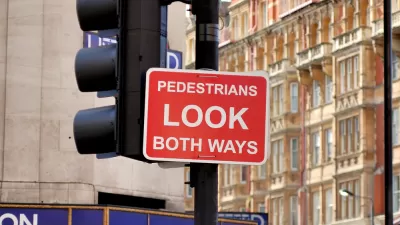Pedestrians of color are more likely to be killed in traffic crashes.

Traffic fatalities have been rising overall across the United States, and the percentage of pedestrians killed is growing. But the impact of these trends is not evenly felt across demographics: Pedestrians of color are more likely to be killed in traffic.
NPR's Morning Edition explores a study in Las Vegas that found that cars were less likely to stop for a black pedestrian than a white one crossing the street—suggesting that driver bias is a real factor in the racial distribution of traffic fatalities.
Correspondent Shankar Vedantam says researchers have been aware of this issue for "quite some time," and there's more research to be done. A larger study could yield additional reasons for the disparity—for instance, "that people of color are just more likely to be pedestrians." When that factor is controlled for, another could be that "minority neighborhoods have less safe traffic intersections"—making a case for focusing on racial equity in transportation planning.
FULL STORY: Researchers Examine Race Factor In Car Crashes Involving Pedestrians

Planetizen Federal Action Tracker
A weekly monitor of how Trump’s orders and actions are impacting planners and planning in America.

Maui's Vacation Rental Debate Turns Ugly
Verbal attacks, misinformation campaigns and fistfights plague a high-stakes debate to convert thousands of vacation rentals into long-term housing.

Restaurant Patios Were a Pandemic Win — Why Were They so Hard to Keep?
Social distancing requirements and changes in travel patterns prompted cities to pilot new uses for street and sidewalk space. Then it got complicated.

In California Battle of Housing vs. Environment, Housing Just Won
A new state law significantly limits the power of CEQA, an environmental review law that served as a powerful tool for blocking new development.

Boulder Eliminates Parking Minimums Citywide
Officials estimate the cost of building a single underground parking space at up to $100,000.

Orange County, Florida Adopts Largest US “Sprawl Repair” Code
The ‘Orange Code’ seeks to rectify decades of sprawl-inducing, car-oriented development.
Urban Design for Planners 1: Software Tools
This six-course series explores essential urban design concepts using open source software and equips planners with the tools they need to participate fully in the urban design process.
Planning for Universal Design
Learn the tools for implementing Universal Design in planning regulations.
Heyer Gruel & Associates PA
JM Goldson LLC
Custer County Colorado
City of Camden Redevelopment Agency
City of Astoria
Transportation Research & Education Center (TREC) at Portland State University
Jefferson Parish Government
Camden Redevelopment Agency
City of Claremont



























